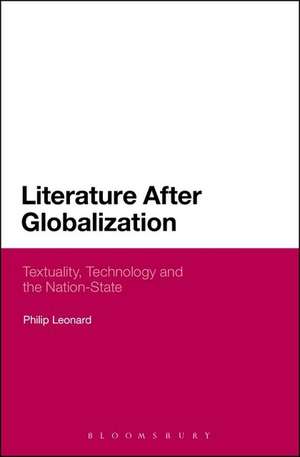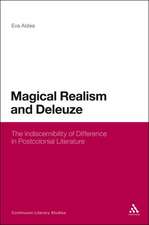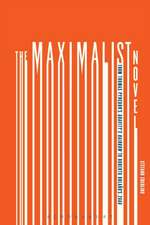Literature After Globalization: Textuality, Technology and the Nation-State
Autor Dr Philip Leonarden Limba Engleză Paperback – 2 iul 2014
| Toate formatele și edițiile | Preț | Express |
|---|---|---|
| Paperback (1) | 256.85 lei 6-8 săpt. | |
| Bloomsbury Publishing – 2 iul 2014 | 256.85 lei 6-8 săpt. | |
| Hardback (1) | 773.39 lei 6-8 săpt. | |
| Bloomsbury Publishing – 16 ian 2013 | 773.39 lei 6-8 săpt. |
Preț: 256.85 lei
Preț vechi: 330.84 lei
-22% Nou
Puncte Express: 385
Preț estimativ în valută:
49.15€ • 51.55$ • 40.92£
49.15€ • 51.55$ • 40.92£
Carte tipărită la comandă
Livrare economică 01-15 aprilie
Preluare comenzi: 021 569.72.76
Specificații
ISBN-13: 9781472579799
ISBN-10: 1472579798
Pagini: 208
Ilustrații: black & white illustrations
Dimensiuni: 156 x 234 x 12 mm
Greutate: 0.33 kg
Ediția:NIPPOD.
Editura: Bloomsbury Publishing
Colecția Bloomsbury Academic
Locul publicării:London, United Kingdom
ISBN-10: 1472579798
Pagini: 208
Ilustrații: black & white illustrations
Dimensiuni: 156 x 234 x 12 mm
Greutate: 0.33 kg
Ediția:NIPPOD.
Editura: Bloomsbury Publishing
Colecția Bloomsbury Academic
Locul publicării:London, United Kingdom
Caracteristici
Includes readings of Atwood's Oryx and Crake, Stephenson'ss Cryptonomicon and Kunzru's Transmission.
Notă biografică
Philip Leonard is Reader in Literary Studies and Critical Theory at Nottingham Trent University, UK. He is the author of Nationality between Poststructuralism and Postcolonial Theory: A New Cosmopolitanism (Palgrave, 2005).
Cuprins
Acknowledgments \ 1 The ends of man: electronic frontiers in an age of global community \ 2 A space without geography, a nation without borders: The Cybergypsies and the literature of being-in-common \ 3 Teach phenomenology the bomb: Starship Troopers, the technologized body, and humanitarian warfare \ 4 'Secure, anonymous, unregulated': Cryptonomicon and the transnational data haven \ 5 'A revolution in code'? Transmission and the Cultural Politics of Hacking \ 6 'Without return. Without place': rewriting the book and the nation in Only Revolutions \ Bibliography
Recenzii
Elegant, challenging and ambitious, Leonard's Literature after Globalization reads contemporary fiction in terms that ask broad questions about citizenship and national identity in the context of the messy fluidity and flux of our networked world. In the process, he generate a range of important insights into the nature of readership, identity and statehood at the start of the 21st century.
Literature After Globalization is no doubt a thought-provoking study.
LeoNard (Nottingham Trent Univ., UK) offers six chapters on five novels of globalization. He writes on Anglo-Indian Indra Sinha's The Cyber Gypsies (1999), a barely fictional memoir of the emergence of early multi-participant online communities. He explores Cryptonomicon (1999), one of the best works of the talented Neal Stephenson, in which the encryption of vast amounts of data is an active theme. Leonard offers perspicacious readings of the Anglo-Indian Hari Kunzru's compelling Transmission (2004), which has a hacker as its protagonist, and of Mark Danielewski's Only Revolutions (2006), arguably not a novel but rather a multi-stranded 360-page meditation on open-ended constuctions of self from fragments of existing culture. A suggestive reading of the film Starship Troopers (1997), based on Robert Heinlein's 1959 book of the same title, is also offered. Leonard's cumulative representation of interfaces between contemporary literature and the digital domain is even more valuable than these fine readings, as are his rapid yet learned and subtle comments on the work of major theorists. This is a rare achievement in the field of literature and globalization, a definite advance on even such competent works as James Annesley's Fictions of Globalization (2006) and Suman Gupta's Globalization and Literature (CH, Oct'09, 47-0689). Summing Up: Essential. Lower-division undergraduates through faculty.
Literature After Globalization is no doubt a thought-provoking study.
LeoNard (Nottingham Trent Univ., UK) offers six chapters on five novels of globalization. He writes on Anglo-Indian Indra Sinha's The Cyber Gypsies (1999), a barely fictional memoir of the emergence of early multi-participant online communities. He explores Cryptonomicon (1999), one of the best works of the talented Neal Stephenson, in which the encryption of vast amounts of data is an active theme. Leonard offers perspicacious readings of the Anglo-Indian Hari Kunzru's compelling Transmission (2004), which has a hacker as its protagonist, and of Mark Danielewski's Only Revolutions (2006), arguably not a novel but rather a multi-stranded 360-page meditation on open-ended constuctions of self from fragments of existing culture. A suggestive reading of the film Starship Troopers (1997), based on Robert Heinlein's 1959 book of the same title, is also offered. Leonard's cumulative representation of interfaces between contemporary literature and the digital domain is even more valuable than these fine readings, as are his rapid yet learned and subtle comments on the work of major theorists. This is a rare achievement in the field of literature and globalization, a definite advance on even such competent works as James Annesley's Fictions of Globalization (2006) and Suman Gupta's Globalization and Literature (CH, Oct'09, 47-0689). Summing Up: Essential. Lower-division undergraduates through faculty.














